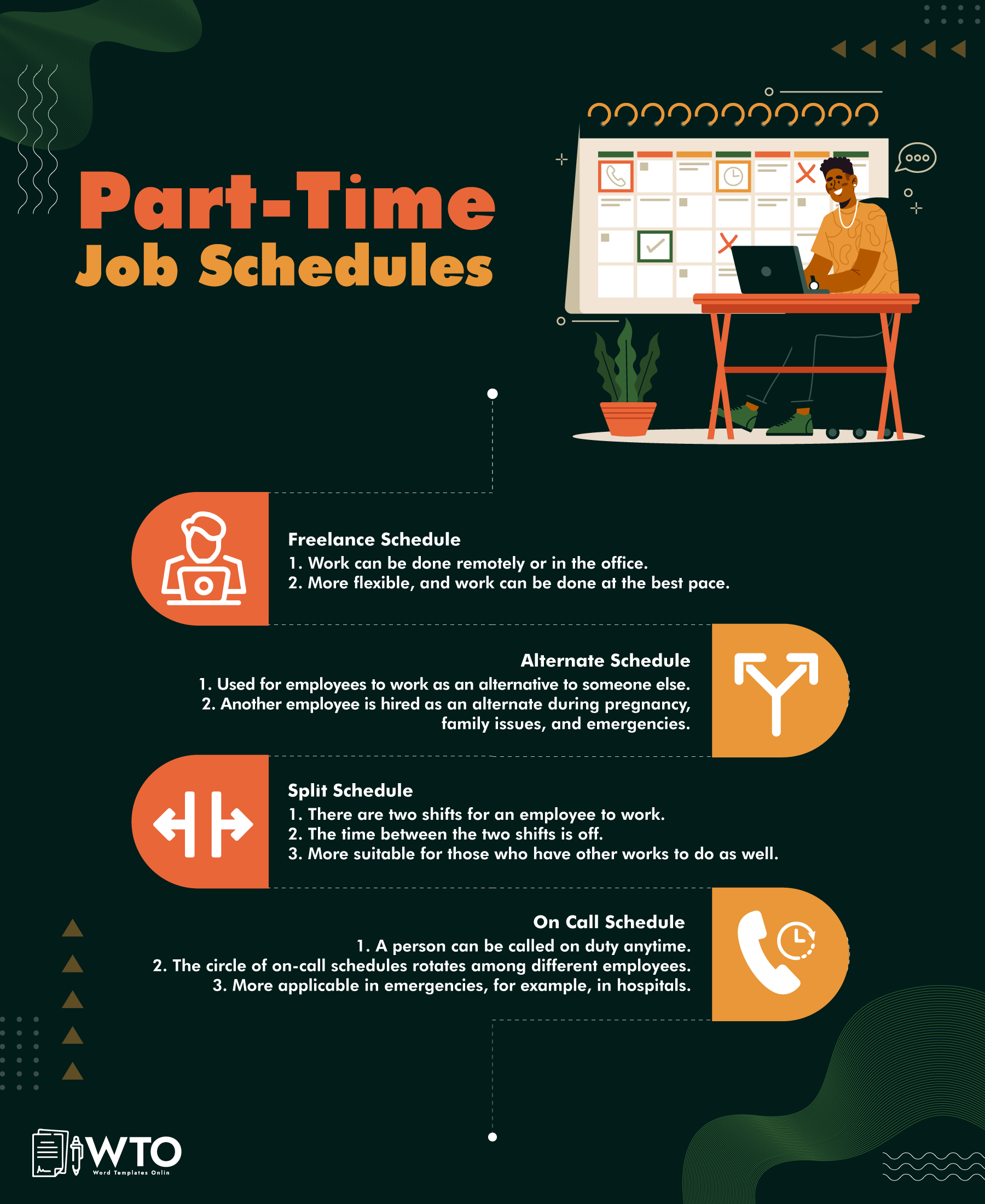Part-time jobs have fewer working hours than full-time jobs. Part-time jobs are organized based on the hours set by the employer. A part-time job is one where you can work fewer hours per week compared to a full-time job. The employer makes this arrangement, and it is the employer’s job to classify workers based on their working hours.
How Many Hours Does a Part-Time Job Require?
There are no formal criteria for classifying a worker as either part-time or full-time. There is no exact definition of it; however, the maximum number of hours in a workweek is 40, according to the Fair Labor Standards Act (FSLA). There are different definitions of “part-time employment” in the U.S.
EXAMPLE
According to the Affordable Care Act, anyone who works fewer than 30 hours per week is considered a part-time employee.
Definitions by agency
Labor standards are typically established by the Fair Labor Standards Act (FLSA). However, it does not define what constitutes a part-time employee or part-time hours.
However, the IRS and U.S. Bureau of Labor Statistics (BLS) define such employees as the following:
IRS definition
The IRS defines a full-time employee for the purposes of the Affordable Care Act (ACA) as someone who works at least 30 hours per week, or 130 hours per month. Part-time employees are those who work less than 30 hours per week (on average) or 130 hours per month.
BLS definition
According to the BLS, part-time workers work between one and 34 hours per week. That would mean people who work over 34 hours a week are full-time employees.

How to Calculate Work Hours Per Week
If part-time employment is what you are interested in, it is especially important to understand how a particular company or firm divides up its working hours. Following are the three ways to determine working hours:
Review the job description
Make sure you read and understand the job description before you apply for a job. From the job description, you should determine the flexibility of the job, how long you will have to work, and the hours and wages paid either weekly or monthly.
Ask the employer during the interview
You could ask about the working hours during the job interview if that is not clear otherwise. It is essential to ask this, especially if the employer does not know exactly when you will be available. Make sure you know when you are available and tell the interviewer.
Know your availability
Before you attend an interview, know your available hours for each day or week. The recruiter will often ask you about the available hours during the interview. Therefore, know your availability before an interview. Most employers are willing to accommodate students and people with other time constraints.
How does a Part-Time Job Differ from a Full-Time job?
A part-time job is a working arrangement that helps employees work fewer hours in a week. This type of schedule is popular among students or people with other jobs. But a full-time job is a schedule where an employee works the total number of hours classified as full-time.
According to the Affordable Care Act, most full-time workers work thirty hours or more weekly. This means that a full-time worker works more hours and earns more money. Most full-time workers work at least 35 hours a week, while part-time work for less. This is one of the key differences between the two.
Advantages and Disadvantages of a Part-Time Job
Part-time work is sometimes preferred because it is more flexible than a full-time job. But it might not be the best. This means that there are both advantages and disadvantages to it, as discussed below:
Advantages
Part-time jobs have the following advantages:
- Better flexibility and reduced stress: It can be very exhausting to work full-time and it can lead to stress affecting your productivity at work. It can also adversely impact your health. It reduces that stress because there are fewer working hours as compared to full-time employees, who work long hours and have a higher workload.
- Time management: Another significant benefit is maintaining a healthy work and life balance. It allows more time for family and other personal activities that require time and attention. Your professional presence in the workplace is unaffected by any of this.
- New opportunities: You have the opportunity to learn in different fields, giving you alternatives for choosing a full-time job. Many employers do not like hiring less experienced individuals for full-time jobs, but they are willing to hire them as part-time employees. You can take advantage of this chance to gain experience, and you can later transition to a full-time position with more duties and pay.
- Additional time to pursue other interests and skills: You can spend your free time learning other skills. For instance, a part-time job is best if you are still in school. This position gives you experience while you pursue your degree.
- Shorter shifts: It is ideal for young people, university students, pregnant women, or people in situations that will make working long hours difficult.
- More time outside of work: Part-time workers frequently have free time after work hours. They have complete freedom to do whatever they need to do at this time. This is great for students who need to work, mothers who just gave birth, caregivers, and people in other situations where they have to be at other places during regular working hours.
- Workers’ compensation and disability insurance: Most employers have compensation or insurance for workers injured or ill at work. Part-time workers are not excluded. Different places have guidelines for workers who become sick or injured. Additionally, the government offers disability insurance to all workers.
Disadvantages of a part-time job
Even though working a part-time job has many advantages, there are some drawbacks, including the following:
- Possibility of a low hourly wage: Such employees in some professions earn less per hour than those who work full time, according to research by Indeed Hiring Lab.
- Lack of benefits: Most part-time jobs offer few employee benefits.
- Promotions: Most top-level positions are reserved for full-time employees. Therefore, such workers are ineligible for specific promotions.
- Workload-related stress: Some managers give the same amount of work to both full-time and part-time employees. Part-time workers do not, however, receive as many benefits as full-time employees do. This leads to workload stress.
Examples of Part-Time Schedules
In part-time work, some people can work fewer hours or days than their full-time colleagues. As a result, there are different work schedules for people who want to do such work:
Freelance
This schedule is based on a fixed contract. In this case, independent contractors or freelancers are hired for specific work or projects. Depending on the type of work, they can work from home or in the office. This schedule’s primary drawback is that these workers are not eligible for employment benefits. But they still enjoy more flexibility than other workers. Also, freelancers can do their work at their own pace.
Alternate
It is an umbrella term that refers to compressed and flexible work schedules. An alternative work schedule is a work arrangement that allows an employee’s starting and ending times to differ from their core hours but does not change the overall number of hours they work each week. In addition, it accommodates temporary issues like emergencies, pregnancy, or other situations.
Split
In this schedule, an employee has plenty of time between his first shift of the day and his second shift. The significant advantage of this schedule is that it is suitable for those with other things to do within the day.
EXAMPLE
A first shift can start from 10 a.m. to 12 p.m., then from 4 p.m. to 6 p.m.
On-Call
An on-call schedule demands an employee be available to work whenever needed. This schedule is primarily for people who work in jobs where emergencies can arise at any time. Firefighters, nurses, doctors, and security men usually practice this schedule. Typically, it is rotated among employees, so everyone gets to be on call some days and free on others.
Frequently Asked Questions
In some cases, if a part-time worker does the job of a full-time worker, the individual can be considered a full-time employee. Companies periodically assess their workforce and decide whether to reclassify their employees. However, there are cases where the company is reluctant to promote the worker to a full-time position, even when they deserve it. The individual can engage an employment attorney to help in such a situation.
Almost every industry offers part-time work, typically due to financial or workload constraints. Industries like building and hospitality are the major employers of such workers. Examples of such positions are clerks or assistants, waiters, and even engineers. There are also some jobs where two or more people work together to complete the same task at various times or in shifts, as in call centers, for instance.
Even though it does not occur in every workplace, some employers may give them holiday benefits.
In some places, such employees may be eligible for some employment benefits. However, the benefits vary depending on the work schedule, and they may not get health benefits, paid leave, or a retirement bonus in some workplaces.












